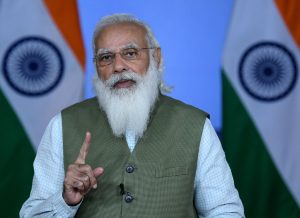
Underlining that it’s a “sacred duty to leave a healthy planet for our future generations,” Prime Minister Narendra Modi said that India is on track to achieve its national commitment on land degradation neutrality.
“We are also working towards restoring 26 million hectares of degraded land by 2030. This would contribute to India’s commitment to achieving an additional carbon sink of 2.5 to 3 billion tonnes of carbon dioxide equivalent,’’ PN Modi said in the keynote address at a United Nations high-level dialogue on Desertification, Land Degradation and Drought on June 14.
In last 10 years, around 3 million hectares of forest cover has been added in India, enhancing the combined forest cover to almost one-fourth of the country’s total area, said PM Modi. He spoke at the Opening Segment in his capacity as the President of the 14th Session of the Conference of Parties of United Nations Convention to Combat Desertification (UNCCD).
Terming land as the fundamental building block for supporting all lives and livelihoods, Mr Modi called for reduction of the tremendous pressure on land and its resources. “Clearly, a lot of work lies ahead of us. But we can do it. We can do it together,” said the prime minister.
Listing steps taken by India to deal with the land degradation issue, PM Modi said that India has taken the lead to highlight land degradation issues at international forums. The Delhi Declaration of 2019 called for better access and stewardship over land, and emphasised gender-sensitive transformative projects. In India, over the last 10 years, around 3 million hectares of forest cover has been added. This has enhanced the combined forest cover to almost one-fourth of the country’s total area, he informed.
Mr Modi cited the example of the Banni region in Rann of Kutch in Gujarat to illustrate how restoration of land can start a virtuous cycle of good soil health, increased land productivity, food security and improved livelihoods. In Banni region, land restoration was done by developing grasslands, which helped in achieving land degradation neutrality. It also supports pastoral activities and livelihood by promoting animal husbandry. “In the same spirit, we need to devise effective strategies for land restoration while promoting indigenous techniques”, the Prime Minister stressed.
In the spirit of South-South cooperation, India is assisting fellow developing countries to develop land restoration strategies, he said. A Centre of Excellence is being set up in India to promote a scientific approach towards land degradation issues, said Mr Modi. “It is mankind’s collective responsibility to reverse the damage to land caused by human activity. It is our sacred duty to leave a healthy planet for our future generations”, he stressed.
Author Profile
- India Writes Network (www.indiawrites.org) is an emerging think tank and a media-publishing company focused on international affairs & the India Story. Centre for Global India Insights is the research arm of India Writes Network. To subscribe to India and the World, write to editor@indiawrites.org. A venture of TGII Media Private Limited, a leading media, publishing and consultancy company, IWN has carved a niche for balanced and exhaustive reporting and analysis of international affairs. Eminent personalities, politicians, diplomats, authors, strategy gurus and news-makers have contributed to India Writes Network, as also “India and the World,” a magazine focused on global affairs.
Latest entries
 DiplomacyJanuary 5, 2026India walks diplomatic tightrope over US operation in Venezuela
DiplomacyJanuary 5, 2026India walks diplomatic tightrope over US operation in Venezuela India and the WorldNovember 26, 2025G20@20: Africa’s Moment – The Once and Future World Order
India and the WorldNovember 26, 2025G20@20: Africa’s Moment – The Once and Future World Order DiplomacyOctober 4, 2025UNGA Resolution 2758 Must Not Be Distorted, One-China Principle Brooks No Challenge
DiplomacyOctober 4, 2025UNGA Resolution 2758 Must Not Be Distorted, One-China Principle Brooks No Challenge India and the WorldJuly 26, 2025MPs, diplomats laud Operation Sindoor, call for national unity to combat Pakistan-sponsored terror
India and the WorldJuly 26, 2025MPs, diplomats laud Operation Sindoor, call for national unity to combat Pakistan-sponsored terror







